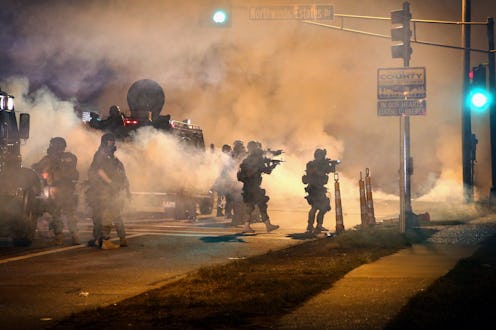News
Social Media Isn't To Blame In Ferguson
On Monday evening, the nation was held captive by the reading of a single decision in Ferguson, Missouri that would determine the fate of Darren Wilson, the police officer who shot and killed 18-year-old Michael Brown. Wilson will not face any charges for Brown's death — and social media exploded. Twitter and Facebook, which have been so instrumental in creating much of the fury and concentrating the attention on Ferguson since the teen's death, were blamed by prosecutor Bob McCulloch for standing in the way of facts and evidence. And needless to say, the Twitterverse and the world of Facebook have found a renewed sense of purpose, and a new source of rage.
Sadly, the decision does not come as a surprise for many who have anticipated the verdict for weeks. And, strangely enough, prosecutor Bob McCulloch chose to emphasize the role that social media played in the verdict, effectively blaming Facebook posts and tweets for the fate of Michael Brown and Darren Wilson. According to McCulloch, the constant news coverage coupled with the "social media rumors were significant challenges in the Ferguson case."
But this, as many have noted, seems like a rather paltry attempt to deflect responsibility away from the jurors, the attorneys and those directly involved in the case.
While it seems difficult to assign responsibility to any one party in such a situation, the decision to point the finger at the masses of Americans who have fought for justice through their own mediums is ludicrous at best, and cruel at worst. And social media users have fired back.
McCulloch's speech, as some pointed out, began with an immediate accusation towards the "community eyewitnesses who used social media to share concern," and more importantly, raise awareness for the state of black lives in America. Social media, which has been so critical in fueling democratic revolutions, like in the Arab Spring, and in spreading information, like in the rescue missions following the Japanese tsunami in 2011, now serves as the scapegoat in one of the most public and divisive cases in recent history. And whereas it seems common to blame Twitter and Facebook in more totalitarian states, the idea of an American democracy attempting to stymie the right of free speech is certainly concerning.
Social media' role in the Mike Brown case was exactly what social media's role should have been: tweets and posts spread information, organized community gatherings and ultimately, created an incredible sense of community and empathy that sadly, often requires tragedy as a catalyst. Social media, as tweeters have pointed out, did not kill Mike Brown. If anything, social media immortalized him, and allowed his name to live on beyond his untimely death.
McCulloch's blaming of social media is particularly alarming considering that a recent study from Pew Research claims that African Americans and Hispanics are more likely to use social media than whites. Moreover, women also appear more active on social media. The most disenfranchised demographics in the United States are the ones whose voices are being raised by way of technology, and are now being chastised for daring to speak. This is unacceptable.
Facebook and Twitter are meant to contribute to conversation, and give users an outlet through which to express themselves freely and to engage in dialogue. This dialogue is not always positive, it is not always politically correct, and it is not always comfortable. But this is when dialogue is most important. The conversations that we should be having following the decision in the Mike Brown case is not how social media hurt, but how social media has, can, and should continue to help prove that all lives matter in the United States, no matter how much our justice system says they shouldn't.
